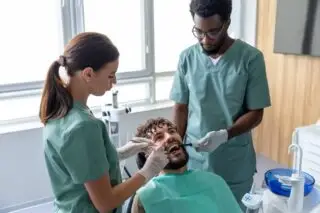 The rise of social media in the world has affected many different aspects of our lives. From the way we communicate with others to how we shop, dine and travel, social media has impacted how efficient and informed we are. Its impact on the health care industry is evident as well. Mobile phones and applications have become an integral part of our lives. The internet allows people to research symptoms, nearby doctors, and medications and their effects. More and more people are sharing information about health care, including reviews about doctors, their experiences with illness and opinions on different therapies. People can also use social media to ask for advice and search for information on the go, which is an important benefit to many people in the workforce who may not have time to consult a physician face to face.1 Medical programs should prepare students to use these apps that will help them connect even further with their patients.
The rise of social media in the world has affected many different aspects of our lives. From the way we communicate with others to how we shop, dine and travel, social media has impacted how efficient and informed we are. Its impact on the health care industry is evident as well. Mobile phones and applications have become an integral part of our lives. The internet allows people to research symptoms, nearby doctors, and medications and their effects. More and more people are sharing information about health care, including reviews about doctors, their experiences with illness and opinions on different therapies. People can also use social media to ask for advice and search for information on the go, which is an important benefit to many people in the workforce who may not have time to consult a physician face to face.1 Medical programs should prepare students to use these apps that will help them connect even further with their patients.
Hospitals are using social media to reach patients
Hospitals are catching on to this trend and implementing programs to promote the use of social media. They can use it to manage their reputation through referrals and reviews and to brand themselves as providers of reliable information to consumers. According to an article by Med City, more than 1,500 hospitals in the U.S. use social media in some format. 2 Sites like YouTube, Facebook and Foursquare (where users check in at different locations) are some examples. Facebook seems to be the favorite, and hospitals use this social media outlet to reach prospective patients or post reviews about patients’ experiences there. Some hospitals are getting creative with how they reach their community. The Mayo Clinic has more than 76,000 listeners to its podcast. Different subjects are discussed in a format for people to download and listen to on their own time, which is appealing to many people who might be curious about different diseases, new advancements in health care, or human interest pieces about people experiencing different health issues. The Mayo Clinic is one example of an institution that offers advice and expertise from health care professionals for free. All of the doctors there are encouraged to take part in using social media. 2 Another example of how social media is being used by hospitals is in the way Rush University used text messages to dispatch doctors to assist in the recovery effort after the 2010 earthquake in Haiti. Massachusetts General Hospital’s doctors collaborated with emergency department researchers to create an iPhone app (called EMNet Finder) that helps people find the closest ER facility to them. A health care provider in Texas used Twitter after the deadly shooting at Fort Hood in 2009 to offer updates on Red Cross news, hospital statuses and ER access, which increased their Twitter following by 78 percent. In Omaha, Neb., a cancer patient used YouTube to post videos about her experience at the Nebraska Medical Center, and in doing so reached so many people that the Center opened up a monthly clinic devoted to treating patients with her type of cancer.2
Patients of all ages are encouraged to use social media
According to a report submitted by GreatCall, 52 percent of smartphone users research health information on their mobile phones. The report also indicated that by 2017 mobile health, or mHealth, is expected to be a $26 billion industry. Currently, more than 97,000 fitness- and health-related mobile applications are offered to users for free or at a small cost. More than 4 million downloads were recorded per day, data which proves the rise of the social media industry’s impact on health care. 3 Medical assistants, who are often the first point of contact for patients as they complete their intake documentation, are learning more about mobile apps and how to encourage all their patients to use them, regardless of their age. The SparkReport study indicated that more than 80 percent of people between the ages of 18 and 24 were likely to share information about their health and experiences with different providers via social media channels. Almost 90 percent of those people said they would trust information they received through social media.1 A study by SparkReport found that more than 50 percent of the senior population they interviewed were ready to use social media to obtain information and communicate with their doctors because of its convenience and speed. This medium allows them to consult a provider without having to leave their home, and when mobility is an issue, this type of convenience is a major benefit for seniors. Forty-five percent of individuals between the ages of 45 and 64 reported they would share information via social media, and 54 percent of that population said they would be more likely to engage with doctors and other patients with this type of media access.1 1 “Rising Use of Social and Mobile in Healthcare,” The Spark Report.com, Dec. 17 2012, http://thesparkreport.com/branding/infographic-social-mobile-healthcare 2 Baum, Stephanie,”Wow of the week: A detailed breakdown of how hospitals are using social media,” MedCity News.com, July 20, 2013, http://medcitynews.com/2013/11/24-outstanding-statistics-figures-social-media-impacted-health-care-industry/ 3 Dilworth, Diana, “Is Mobile Healthcare the Future?” MediaBistro.com, Aug. 20, 2013, http://www.mediabistro.com/appnewser/is-mobile-healthcare-the-future-infographic_b39773



